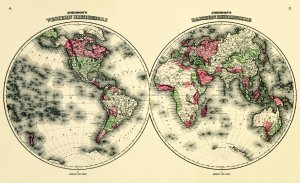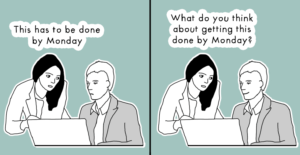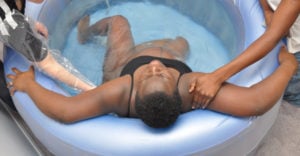Originally published on The Huffington Post and republished here with the author’s permission.
Come with me. Let’s open the door to a parallel universe. You unlock this door with a key of imagination, just like on The Twilight Zone.
Here in this parallel world, the rules are different because gender roles are flipped.
Loving parents and teachers accept this strange culture as if it’s not so bad, or perhaps even good. As if the reverse of this culture could exist only in the minds of fiction writers or lunatics.
As we travel together, let’s observe the childhood of one baby boy, born into this alternate reality, as seen through the eyes of his mother:
In the Womb
It’s your baby shower, and everyone has known for several months that you are having a boy.
It’s so wonderful after having had a girl first to finally be having a precious little boy.
You receive carefully chosen baby gifts that celebrate your son’s gender. Everyone’s favorite item is a tiny white onesie with powder blue lettering that says Future Trophy Husband.
You think for a fleeting moment that this is a bit odd, even inappropriate, but all of your friends think it’s super cute.
You guess that it is.
Birth
He has finally arrived, and you name him Logan! He is healthy and rosy-cheeked and weighs almost 9 pounds.
When it’s time to take him home, you say goodbye to the skilled and compassionate nurses who took such good care of you both, and one of them tells you, “He is so gorgeous. I bet he’ll be a model one day.”
Age 1
Happy first birthday to Logan!
You keep the party small and inexpensive – mostly family and a couple of friends.
Grandma brings a cake from the supermarket.
It is covered in blue icing, has a crown on top, and says “For the Birthday Prince.”
Age 2
Christmas this year involves lots of presents, and Logan loves the wrapping paper and ribbons more than the toys inside, like most toddlers.
He receives so many wonderful gifts. There is a set of musical instruments, all pale blue. There is a special box of boy Lincoln Logs made of blue plastic.
There is a little blue T-shirt that says, “I’m too handsome to read books, so my sister reads them for me.”
He can’t read yet and doesn’t understand that slogan, but the adults all laugh, so he laughs, too.
Age 3
Logan is an active preschooler.
As he runs through the house, you hear the tap-tap-tapping of his little shiny dress shoes on the hardwood floors. Occasionally, he slides in them and goes down on his bum, but he gets right back up again.
Outside is a new swing set. He loves to try to run up the slide, but it’s tricky in those smooth-soled shoes.
When he wears them to preschool, the teachers notice that it’s hard for him to run and climb like the girls, but they gush over how handsome he looks in them.
Age 4
Now in pre-K, Logan is really into imaginary play.
You love to watch him play with the boys and do boy things.
There’s a bright blue oven, a powder blue vacuum cleaner, and a popular building station – an enormous bin of blue and purple Lego Buddies sets that can be made into spas, shopping malls, and pet stores.
Next to that there is another bin of male fashion dolls that all have sultry eyes, pouty lips, and tight, sexy clothes.
The boys know who they are. They are boys!
They avoid the girly doctor kits and toy cars and multi-colored game boards. Those come from the girl aisle.
Age 5
The years are flying by, and Logan is now in kindergarten.
On the first day of school, his teacher asks the children lots of questions so he can get to know them.
Who has a pet at home? The children chatter about dogs and cats and goldfish and hamsters.
What is your favorite color? Green! Red! Black! Yellow! Pink! Brown! Orange! say the girls. Blue! say all of the boys except one, who says Purple!
No girls say blue or purple.
You notice this too and think it’s a little strange, but when you mention it to a friend, she tells you this is natural for boys and exclaims how nice it is that boys can be boyish.
Age 6
Logan is learning to read!
There are so many books in his classroom, and he naturally gravitates to books about princes. He even wears his Prince Charming costume to school most days and keeps it clean.
He daydreams about growing up rich and living in a castle and being married to a beautiful princess.
You love that he is learning the important princely qualities of kindness, good grooming, and an appreciation for the finer things in life.
You do wish he’d like books about science, too, so you buy him a book called The Astronaut Prince.
It has an enchanting illustration on the cover of an astronaut in a pale blue sparkly spacesuit that has a crown insignia on the chest. You love that Logan can read about being a prince and an astronaut!
Age 8
In his third grade classroom, Logan has a short, simple writing assignment.
He is to write about a “goal” that he has in life. He is torn – he wants to be the president, and he wants to be a prince. So he writes about both.
He thinks perhaps he’ll be a prince who’s also the president and gets to wear royal tights and a jeweled crown in the White House.
But soon enough, the “prince phase” has passed. He finds his earlier writing assignment and announces to you, “Princes are babyish. I don’t want to be that anymore.”
When you suggest that he might still become president, he corrects you. “No, mom, I want to be a famous singer or model or movie star – like all the boys.”
Age 11
Middle school!
It’s a whole new world with different classrooms, different teachers, and kids who seem to have changed a lot over the summer.
Sometimes he pretends to be dumb so girls will like him.
Logan feels some pressure to conform. He wants to dress like the other boys in clothes that you and his father feel are a bit too clingy and revealing.
He notices how hot and sexy all of the boys are on television and in the movies, and he wants to be hot and sexy too, so he rolls up the bottoms of his turquoise shorts to make them shorter, hoping not to receive a dress code violation.
He has mastered the ability to look around nonchalantly as he walks down the hall, checking to be sure the girls are admiring his body.
Age 14
Logan has been playing soccer for several years, but he suddenly drops out.
When he competes, he gets sweaty, his hair gets messed up, and he doesn’t like the way his legs look when he’s running. He knows that girls could be eyeing him, and he is gripped by self-consciousness.
It’s okay, though. He has plenty of male friends who have also decided that athletics make them look gross, so now they all watch the girls’ matches from the sidelines and cheer the girls on.
Age 17
It’s time to look at colleges.
Logan is excited for this new chapter in his life. He’d like to apply to engineering schools and he might, even though he knows it’s a woman’s world and that he’ll have to perform twice as well to be perceived as half as good.
He’ll face a lot of sexism and sexual harassment in the workplace. He’ll get paid less than the women, who everyone knows are innately better at science.
Deep down, he wonders if he can be handsome and sexy and a chemical engineer, and whether he’ll be able to one day balance having a family with that kind of job.
You tell him that even though he sees these stereotypes a lot in the media, men can do anything women can.
Age 21
Logan is now an adult in his final year of college, and beginning to interview for jobs after graduation.
He always dresses well for his interviews, wearing a slimming outfit that makes him look both professional and attractive.
As he navigates the city streets that he hopes will connect him to a future full of happiness and success, he passes by billboards and bus ads of men in G-strings with flawless, Photoshopped bodies.
He barely notices them.
As he mentally rehearses for an upcoming interview, he walks down the sidewalk, lost in thought. “Smile, baby!” a woman calls out to him. “You look more handsome when you smile.”
***
We leave Logan’s story here, because here is as good as anywhere, and we wish him luck.
Thank you for joining me on this whimsical journey.
I now return you to the world you know, the one that needs changing.
[do_widget id=”text-101″]
Lori Day is an educational psychologist, consultant and parenting coach with Lori Day Consulting in Newburyport, MA. She is the author of Her Next Chapter: How Mother-Daughter Book Clubs Can Help Girls Navigate Malicious Media, Risky Relationships, Girl Gossip, and So Much More, and speaks on the topic of raising confident girls in a disempowering marketing and media culture. You can connect with Lori on Facebook, Twitter at @lori_day, or Pinterest.
Search our 3000+ articles!
Read our articles about:
Our online racial justice training
Used by hundreds of universities, non-profits, and businesses.
Click to learn more





















